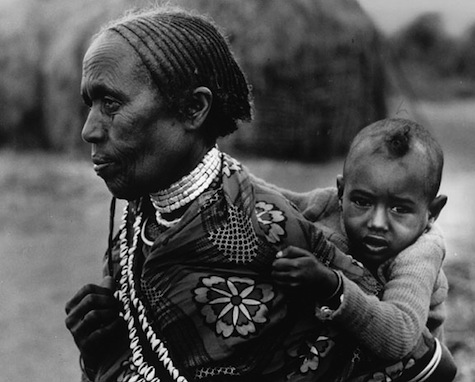 Evolution
Evolution
 Intelligent Design
Intelligent Design
More Evolutionary Storytelling: The Enigma of Grandmothers

Judith Shulevitz is a writer I admire, not least for her good timing, better than my own: She wrote a wonderful and highly praised book on the Sabbath (The Sabbath World: Glimpses of a Different Order of Time) that came out 18 months before the book on the same subject that I collaborated on with Senator Joe Lieberman (The Gift of Rest: Rediscovering the Beauty of the Sabbath). I would rather the order had been the reverse.
Anyway, she has a thoughtful and well done article in The New Republic that tries to solve the “evolutionary mystery” of grandmothers.
There seems to be no utility, in evolutionary terms, in women living decades past childbearing age. In fact, among creatures in nature, only humans, pilot whales and orcas share this distinction. Very interesting. The current explanation on offer, the “grandmother hypothesis,” holds that women who lived long past the cessation of their menstrual cycles were favored by natural selection because this allowed them time to help care for their daughters’ (especially but also their sons’) children. These children enjoyed the undoubted advantage of having in effect two mothers, and the genes needed for long-lived grandmothers were thus established in our species:
[T]he grandmother hypothesis has gone from oddball conjecture to one of the dominant theories of why we live so long, breed so fast, and are so smart. The extra calories and care supplied by women in their long post-fertile period subsidized the long pre-fertile period that is childhood. And that’s what made us fully human.
Judith rightly worries about social trends, like late marriage and divorce, that are cutting into this advantage and so she proposes government programs that might ameliorate the situation. Or might not. She observes that “in our conservative United States” they aren’t very likely anyway.
Politics aside, I would ask Judith if she sees what appears obvious to me: the element of neccesity-driven storytelling in this as in so many evolutionary hypotheses. Darwinian theory makes a claim: Natural selection does not preserve costly features that serve no reproductive purpose. When the prediction is falsified, Darwinian evolution is driven, by the necessity of preserving the theory, to tell an imaginative tale.
I pointed you to an example yesterday of how fragile these stories are, even when they appear to be backed by very solid and impressive research. Note well, on the grandmother question, the alternative theory of intelligent design doesn’t have to reach for an explanation. There are all kinds of good reasons, beyond doubting, that children should see and live nearby grandparents. My wife and I dearly wish our own kids could see more of their grandmothers, one of whom is not in good health. Even more we wish they could know those grandparents who have already passed away.
The sense of cultural and spiritual continuity is one thing that we as parents can’t give our kids in nearly the same way that our parents can, or could have done if they were alive. The art and tradition of parenting itself is something of which I sometimes feel impoverished. These, far more than help around the house, are the main reason we’d love to get more grandmother time than we do. If human nature bears the imprint of a design, it makes immediate sense why grandparents don’t die as soon as their own children are out the door. But evolution takes no account of such things, and so its explanations are inevitably thin and improvisational.
Still, Judith Shulevitz wrote a good and interesting article that I encourage you to go over and read.
UPDATE: I see that Judith has been writing a lot lately about issues related to parenting and children. That probably means she’ll publish a book on it — and then so I will, 18 months later.
Image: Grandmother carrying child in Borana, Ethiopia/Wikicommons.
